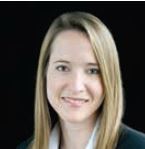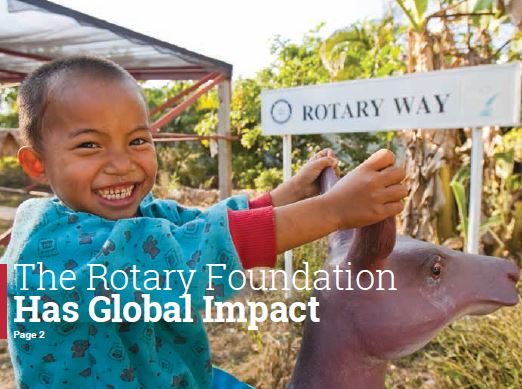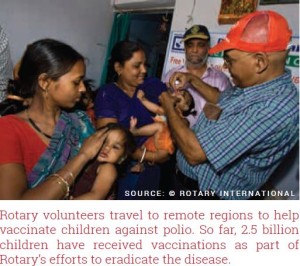 Karena Bierman is Director of Gift Planning at The Rotary Foundation in Evanston, Ill., the fundraising arm of Rotary International. During the past 110 years, Rotary has grown to become a major factor in both local and global initiatives to address critical issues affecting quality of life for millions.
Karena Bierman is Director of Gift Planning at The Rotary Foundation in Evanston, Ill., the fundraising arm of Rotary International. During the past 110 years, Rotary has grown to become a major factor in both local and global initiatives to address critical issues affecting quality of life for millions.
Give & Take: What led you to become a gift planner?
Bierman: After practicing law for several years at a downtown Chicago law firm, I realized that I wanted to do something that would allow me to give more back to the community. I started looking for a nonprofit I could put my heart into, and I found Rotary. I was drawn to Rotary’s dedication to ethics and commitment to improving opportunities for others.
A career in gift planning appealed to me because it requires me to use both sides of my brain. Working with donors and designing effective marketing require creativity, but I also enjoy crunching numbers, contemplating tax and other financial implications of gifts and watching the markets. I joined The Rotary Foundation as a gift planning officer 10 years ago, and I now serve as the Director of Gift Planning.
 Give & Take: Can you share some of Rotary’s history and its evolution through the years?
Give & Take: Can you share some of Rotary’s history and its evolution through the years?
Bierman: When I tell people I work for Rotary, I’m always surprised by how many people have a personal story about how Rotary has improved their lives. Whether they received a grant, their child received a scholarship or their community was bettered by a Rotary project, it’s always rewarding to learn how many people’s lives have been touched by Rotary.
Rotary was founded in 1905 by a group of businessmen in Chicago who wanted to establish a forum to exchange ideas, promote ethics and better the community. The idea caught on quickly and within 16 years, Rotary had a presence on six continents. Rotary now has 1.2 million members worldwide.
Rotary clubs are managed locally yet are associated with and supported by The Rotary Foundation. Local clubs decide what impact they would like to make on their community or on the world and then can apply to The Rotary Foundation for help. We use our expertise to ensure their proposal is sustainable and that their project will be managed properly, both financially and ethically. As a result, Rotary projects are community driven and managed. Local people identify a need and The Rotary Foundation gives them a way to fulfill that need.
Give & Take: Can you talk about Rotary’s involvement in the international initiative to conquer polio?
Bierman: Rotary was the exclusive leader behind the eradication of polio in the Philippines in 1979 and has continued the fight against the disease ever since. The Rotary Foundation provided the initial grant to vaccinate children against polio in the Philippines to test if the disease could be eradicated in one area, and it worked! That got people thinking that if we can destroy the threat of polio in one area, we could do it globally. Now, 35 years later, we are just about to close the door on polio. Polio is now endemic in only three countries—Nigeria, Afghanistan and Pakistan. If everyone stays committed and financial resources are made available, it will be just the second disease to ever be eradicated from the planet, following smallpox in 1979.
To that end, our End Polio Now campaign has enjoyed significant support from the Bill & Melinda Gates Foundation. As part of a recent gift, they will match $2 for every $1 Rotary spends on polio eradication, up to $35 million, through 2018. They are doing this not just to help raise funds but also to raise awareness of Rotary’s polio eradication efforts. People often think that since it is not in the U.S., the polio virus is gone, but there is still a need. The virus is still present.
The planned giving area at Rotary doesn’t directly market for polio gifts because the need is more imminent, but it is certainly a passion of this organization and a testament to Rotary’s commitment to improving the world.
Give & Take: With such a global constituency, how are you able to interact with your donors?
 Bierman: We have a couple of different avenues for doing that. First, we have a number of trained volunteers in each region charged with keeping in touch with our donors. We also have major gift officers and other staff assigned to various regions (called Rotary zones) who are responsible for meeting and working with our supporters on a face-to-face basis as often as possible.
Bierman: We have a couple of different avenues for doing that. First, we have a number of trained volunteers in each region charged with keeping in touch with our donors. We also have major gift officers and other staff assigned to various regions (called Rotary zones) who are responsible for meeting and working with our supporters on a face-to-face basis as often as possible.
We also recently launched a Gift and Estate Planning Professionals Group, which allows Rotarians who are CPAs, estate planning attorneys or fund development professionals to become another resource for donors—to help us say thanks but also to answer questions and act in a gift advisor capacity.
Additionally, we keep our donors updated on Rotary’s activities through our annual report and our estate planning newsletter, Visions.
Give & Take: I understand you have broadened the audience for your gift planning newsletter beyond the United States.
Bierman: For several years, Sharpe Group has helped us produce our planned giving newsletter for donors in the U.S. Recently, Sharpe also helped us produce two very successful newsletters exclusively for Canadians. Now we are looking at broadening the audience into the U.K. and perhaps Australia.
Give & Take: With such a large and diverse constituency, you must have a lot of interesting gifts.
Bierman: All of our donors are interesting! One trend that I’ve noticed recently is that more female donors are making significant gifts. Just this year, I’ve worked with two women who are planning to make seven-figure gifts. While some still mistakenly think of Rotary as a men’s organization, women have taken on a strong leadership role over the years and are devoted to the causes we address, both locally and globally.
Another interesting gift we recently worked on involves a family with a long history of involvement in Rotary. A third- generation Rotarian has decided to leave his estate to his children for their benefit for their lifetime with the remainder going to The Rotary Foundation. Right now, the remainder is estimated to be tens of millions of dollars.
This very generous gift has been both interesting and challenging for us to work with because of its long-term nature. We are setting up conditions that will be enforced and in effect for several decades, depending on the longevity of the donor’s children. In setting up the conditions, we are instructing the future workers of Rotary how to handle this amazing gift while at the same time encouraging his family to stay committed to Rotary and our mission. I was honored to be able to help.
Give & Take: Do you have any advice for people who are new to gift planning?
Bierman: People who are just starting out need to appreciate the intricacies and subtleties of what they’re doing. It’s important that they don’t go rushing out to talk to donors on Day Two. They need to make sure they’ve taken the time to learn everything they need to know and have applied it in a non-risk situation. Above all else, they need to make sure they don’t give someone bad advice.
Give & Take: What do you like most about your job?
Bierman: I get to meet people who are committed to changing the world. They often have financial and other advisors, but in many cases no one’s helping them intellectually structure their charitable giving. They have made the emotional decision to support Rotary, but once they decide that, what’s next?
It’s like a puzzle. When I have conversations with donors, they tell me pieces of information, some of which they may have no idea is valuable in addressing their challenges. When we start turning the pieces, not unlike a Rubik’s Cube, we sometimes find an option that solves several problems at once. This is where the right and left brain both come into play in many instances.
I love helping people who are using their wealth not for some percentage gain or investment return but to better the world we share. These supporters want to make the planet a better place for people to live. Helping them accomplish their goals is what makes my job so meaningful.

